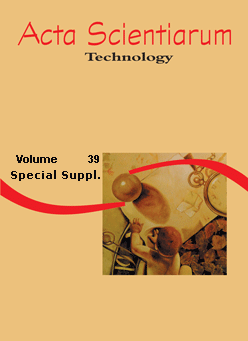<b>Investigation of the effect of temperature and pretreatment on the rehydration capacities of dried nectarine slices
DOI:
https://doi.org/10.4025/actascitechnol.v39i5.30412Keywords:
rehydration curves, pretreatment, effective diffusivity, mathematical models.Abstract
 In this study, the effect of temperature and pretreatment on the rehydration capacity of nectarine slices dried either with pretreatment and under ambient conditions (`natural´) at 50°C in a cabinet dryer was investigated. Rehydration proceeded with distilled water at three different rehydration temperatures (25, 50, and 75°C). Initial rehydration rates increased with rehydration temperature for all samples and were highest for the potassium carbonate (potas)-pretreated samples. At all rehydration temperatures, the equilibrium moisture content was highest for those pretreated with potas solution. The values of Deff varied from 2.79 to 4.32x10-10, 1.72 to 2.34x10-10, and 1.86 to 2.58x10-10 m2 s-1 for potassium carbonate, citric acid, and natural samples, respectively. The activation energy values were 5.65, 6.06, and 8.29 kJmol-1 for citric acid, natural, and potassium carbonate nectarine slices, respectively. The rehydration data were fitted to Peleg and first-order kinetic models: the first order kinetic model was found to be the most appropriate model for rehydration of nectarine slices.
Â
Downloads
Downloads
Published
How to Cite
Issue
Section
License
DECLARATION OF ORIGINALITY AND COPYRIGHTS
I Declare that current article is original and has not been submitted for publication, in part or in whole, to any other national or international journal.
The copyrights belong exclusively to the authors. Published content is licensed under Creative Commons Attribution 4.0 (CC BY 4.0) guidelines, which allows sharing (copy and distribution of the material in any medium or format) and adaptation (remix, transform, and build upon the material) for any purpose, even commercially, under the terms of attribution.
Read this link for further information on how to use CC BY 4.0 properly.















8.png)




